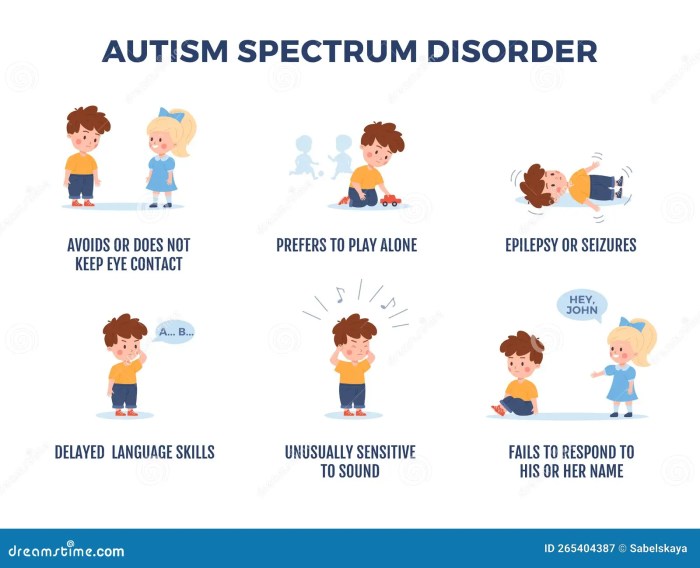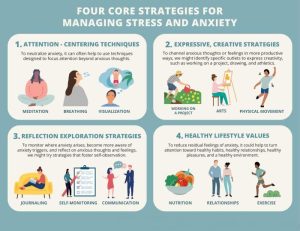
Exploring the early signs of autism spectrum disorder in toddlers opens a door to understanding crucial indicators that can shape a child’s future. Delve into the world of social communication cues, repetitive behaviors, and sensory sensitivities to unravel the complexities of autism spectrum disorder in its early stages.
Uncover the significance of timely detection and intervention to provide the best support for toddlers exhibiting signs of autism spectrum disorder.
Early Signs of Autism Spectrum Disorder in Toddlers
Autism Spectrum Disorder (ASD) can often be identified in toddlers through various early signs that manifest in their social communication, behavior, and sensory sensitivities. Recognizing these signs early on is crucial for timely intervention and support.
Common Social Communication Red Flags
Social communication difficulties are common in toddlers with ASD. Some red flags to look out for include:
- Limited or no eye contact during interactions
- Difficulty in understanding and responding to social cues, such as facial expressions or gestures
- Delayed or absent development of spoken language
- Difficulty in initiating or maintaining conversations with others
Repetitive Behaviors and Restricted Interests
Children with ASD often engage in repetitive behaviors or have restricted interests. Examples of these behaviors include:
- Repeating the same actions or phrases over and over
- Fixating on specific topics or objects with intense focus
- Resistance to changes in routines or environments
Sensory Sensitivities
Sensory sensitivities are also common in toddlers with ASD and may manifest in various ways, such as:
- Overreacting or underreacting to sensory stimuli like lights, sounds, textures, or smells
- Being sensitive to certain clothing materials or tags
- Seeking specific sensory input, like spinning or rocking, for self-regulation
Importance of Early Detection and Intervention
Early detection of ASD in toddlers is crucial for providing appropriate interventions and support services. Research has shown that early intervention can significantly improve outcomes for children with ASD, helping them develop essential skills and reach their full potential.
Child Health
Regular pediatric check-ups play a crucial role in monitoring a child’s developmental milestones and overall health. These routine visits allow healthcare providers to track a child’s growth, development, and well-being over time, identifying any potential concerns early on.
Parental Observation
Parental observation is key in recognizing potential health issues in children. Parents are often the first to notice any changes or unusual symptoms in their child’s behavior, appetite, or overall well-being. By staying vigilant and proactive, parents can help healthcare providers address any health issues promptly.
Promoting Overall Health
- Encourage a balanced diet with nutritious foods to support physical and cognitive development.
- Ensure regular physical activity and playtime to promote motor skills and overall well-being.
- Establish a consistent bedtime routine for adequate sleep, crucial for a child’s growth and development.
- Limit screen time and encourage interactive play for social and cognitive development.
Common Childhood Health Concerns
- Common colds, flu, and other viral illnesses – Monitor symptoms and seek medical advice if they persist or worsen.
- Allergies and asthma – Be aware of triggers, have necessary medications on hand, and follow an action plan provided by the healthcare provider.
- Skin conditions like eczema or rashes – Keep skin moisturized, avoid irritants, and consult a dermatologist if needed.
- Gastrointestinal issues like constipation or stomachaches – Maintain a balanced diet, encourage hydration, and consult a pediatrician if problems persist.
- Behavioral or developmental concerns – Seek early intervention services if you notice delays in speech, social skills, or other developmental milestones.
Ending Remarks

In conclusion, being aware of the early signs of autism spectrum disorder in toddlers empowers parents and caregivers to take proactive steps towards diagnosis and intervention. By recognizing the red flags early on, children can receive the necessary support to thrive and reach their full potential.
Popular Questions
What are some common social communication red flags in toddlers that may indicate autism spectrum disorder?
Some common red flags include limited eye contact, difficulty with back-and-forth conversation, and challenges in understanding social cues.
How do sensory sensitivities manifest as early signs of autism spectrum disorder in toddlers?
Sensory sensitivities might be seen in extreme reactions to sounds, textures, or lights, leading to meltdowns or avoidance behaviors.
Why is early detection and intervention important for toddlers showing signs of autism spectrum disorder?
Early detection allows for timely support and intervention, which can significantly improve long-term outcomes for children with autism spectrum disorder.






